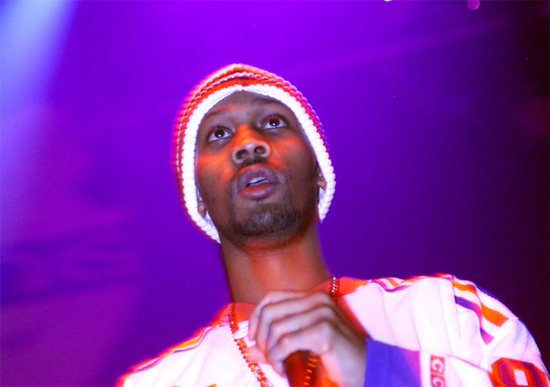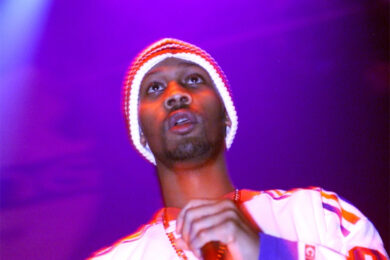As much a business institution as a musical one, New York’s Wu-Tang Clan has long been – at least for some of its members – largely a vehicle to other things. Led by producer and mastermind RZA – born one Robert Fitzgerald Diggs – the Wu emerged in 1993 and quickly used their stunning debut Enter the Wu-Tang (36 Chambers) as something of a Trojan horse, knocking the industry for six and paving the way for innumerable solo releases, side projects and merchandise opportunities.
The curious thing – bearing in mind the scope of the careers and business endeavours it launched – is that 36 Chambers was a rather unlikely figurehead for commercial success. At the time of its release the West Coast was busy revolutionising hip hop, pushing the genre into increasingly slick and melodic territories with a G funk template that comprised of clean productions, fat bass lines and memorable synth hooks. It was a recipe that would help take rap well and truly into the mainstream, winning over a share of traditionally pop territories.
Wu Tang’s answer to this was a sound so raw it would make a plate of sushi blush. Characterised by rough and ready sonic collages, the album drew upon scratchy soul samples, kung fu movie extracts and minimalist beats, the gloriously lo-fi sound providing a notably stark backing for the nine MCs present. Just as artists in genres such as punk and black metal had utilised primitive productions to their advantage, so too were Wu-Tang Clan able to capture a distinctly gritty atmosphere, one that perfectly complimented their tales of crimes and tough times and sat in contrast to the more bombastic efforts appearing at the time. The result was one of hip hop’s most enduring albums, a slow-burning gem that carried with it a rare sense of spontaneity and chemistry that remains largely unmatched even today. Widely held to be the group’s finest hour, it is a document of time when the Wu’s music was still the focal point and its members hunger was tangible.
The sprawling but frequently effective follow-up, Wu-Tang Forever, took a somewhat different approach sonically. Released in 1997, following a wave of solo albums by almost all key members, its two discs retained the kung fu themes of old as well as the electric and increasingly sophisticated lyrical interplay between the various members, but demonstrated a far bigger, more powerful production that blended strings, crisp beats and pulsating subwoofer-testing bass lines. Given RZA’s ambition and the fact that the first album had been largely defined by cheap equipment and a lack of studio time, this was a natural development and the album maintained the core of the Wu sound, even though the frequent references to Five-Percent Nation spirituality sat somewhat uneasily amongst the tales of murder and sex.
It is these two albums that still provide the majority of material for the Wu-Tang live shows, unsurprising given that the two albums that followed – 2000’s The W and 2001’s Iron Flag – saw declining sales and a somewhat mixed reception, despite the unusually jovial ‘Gravel Pit’ (and it’s Flintstones meets Enter the Dragon promo video) proving to be the Wu’s most accessible cut to date. The last album, 2007’s 8 Diagrams, saw little support from the group, the majority of publicity coming instead from the disagreements over creative direction – most publicly between founder RZA and MCs Raekwon and Ghostface Killah – that the opus had sparked.
It’s a major plus therefore that the group’s appearance at Brixton Academy features so many of the core members; hardly a given bearing in mind how often the group dip into the ranks of the several hundred-strong army of affiliate members. Thus alongside the DJ known as Mathematics we have RZA, Raekwon, GZA, Mastakilla, Ghostface, Inspectah Deck and U-God, meaning that a hearty proportion of the original members are present, Method Man being busy filming CSI and Old Dirty Bastard being sadly long departed from this mortal coil. Not a bad start at all.
The problem is despite the stellar talent and material – which drew primarily from 36 Chambers and to a lesser extent, Forever, with further cuts including ‘Gravel Pit’ and a few choice selections from GZA’s Liquid Swords album – the overall impression is one of chaos. Vocals and backing tracks are continually turned into barely audible fuzz, beats and piano loops buried to create – at the risk of sounding like your dad – what frequently sounds like little more than a load of blokes shouting. The Wu have enough memorable lines to fill a book – and may, for all we know, already have done so given the wide scope of their merchandising – but tonight it’s not always clear what song is being played, even for those well versed in their back catalogue.
While much of the problem may lie in Brixton’s sound system, Wu-Tang Clan do undoubtedly need to work harder if they intend to keep their collective beast alive as an entity in its own right. Given the successful and profitable producing, acting and solo musical careers that have spawned from the group, it’s possible that there is simply not enough spare time for this to be a realistic – and from the member’s point of view, even a desirable – possibility. Nonetheless, as a musical group Wu-Tang Clan face a struggle to remain relevant and not merely an artefact from the past.
Even if the Wu plan to simply tour a greatest hits set then they undoubtedly need to make more of the performance itself, even if this just means letting each song breathe rather than blitzing through one number after another. Appearing on stage an hour late – and then leaving after little more than an hour – comes across as half-hearted, a suspicion born out by the complete lack of merchandise on sale inside the building, all but unheard of these days, but doubly perplexing given the group in question. Needless to say, finishing the set by talking about forthcoming film and clothing possibilities is hardly a fitting reward for those who have paid a not-insubstantial amount to be here.
Looking at the Wu, it’s hard not to think of The Prodigy. They formed at around the same time but now headline stadiums and – recently – 65,000 strong festivals. A few years ago The Prodigy were also a shadow of their former themselves, ranks depleted and profile diminished, yet they were able to rejuvenate themselves thanks to a stellar album and strong sense of live showmanship. Relying on nostalgia is a dangerous tactic, particularly in the hip hop scene which is arguably more likely to judge artists by their most recent movements than other genres. Yes, rap may have overtaken the mainstream but continually successful veterans who can pull in large crowds based purely on past efforts – the equivalent of Guns N Roses, Oasis or Rolling Stones of the world – are somewhat fewer and farer between.
The Wu clearly still have a fiercely loyal fanbase and it’s that fact that largely rescues this show, songs such ‘C.R.E.A.M’, ‘Clan In Da Front’, ‘Protect Ya Neck’ and ‘Reunited’ still proving irresistible even when battered by poor sound, inspiring crowd movement and a sea of hands forming the W. They also appear to have enough fire in their bellies to put energy into their delivery, the group marching up and down the stage, trading verses and even spraying the crowd with champagne. Despite the criticisms it’s hard to feel totally disappointed by this appearance, but by the same token such glimpses of brilliance highlight how much more essential this show could have been. While the venue must bear some of the responsibility in terms of sound, the group themselves must nonetheless surely decide whether it’s worth making the most of their combined talent before the world stops caring, or continue on their own paths and let the Wu name rest.



